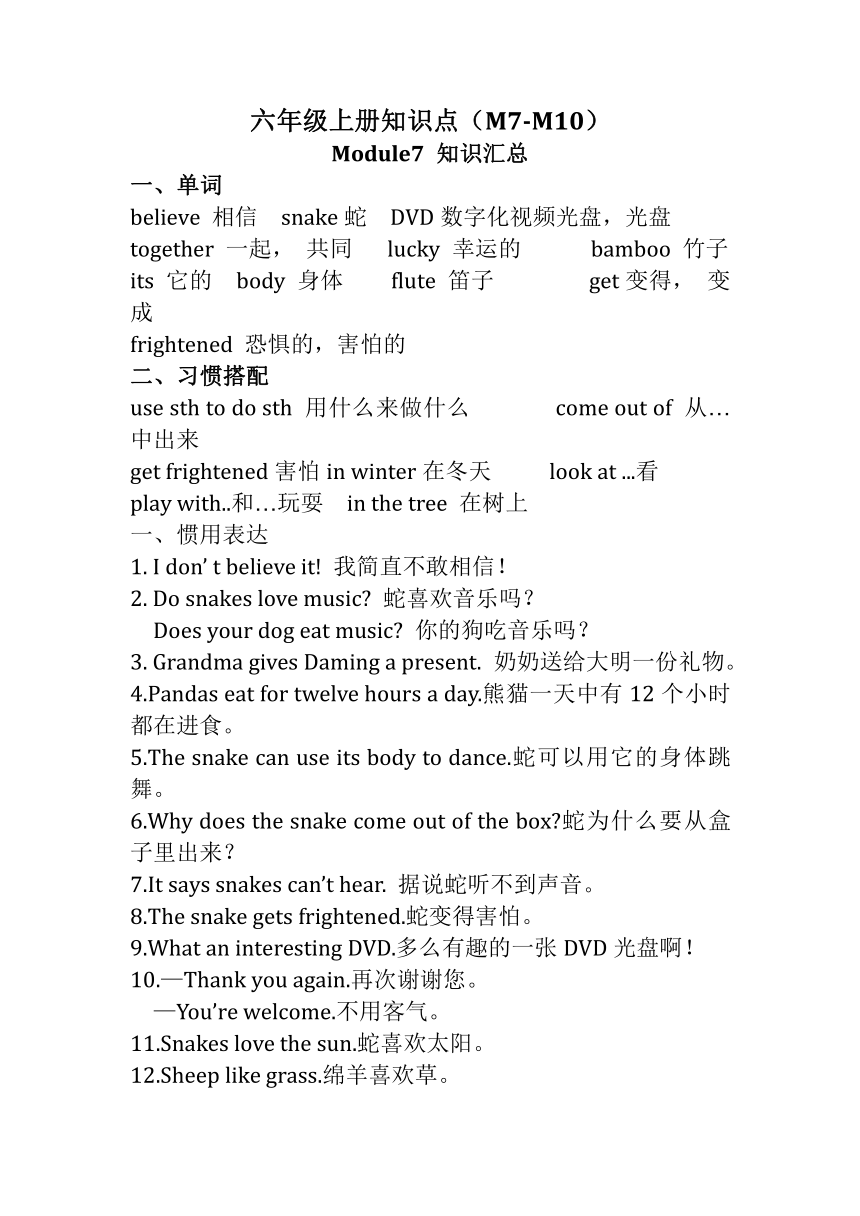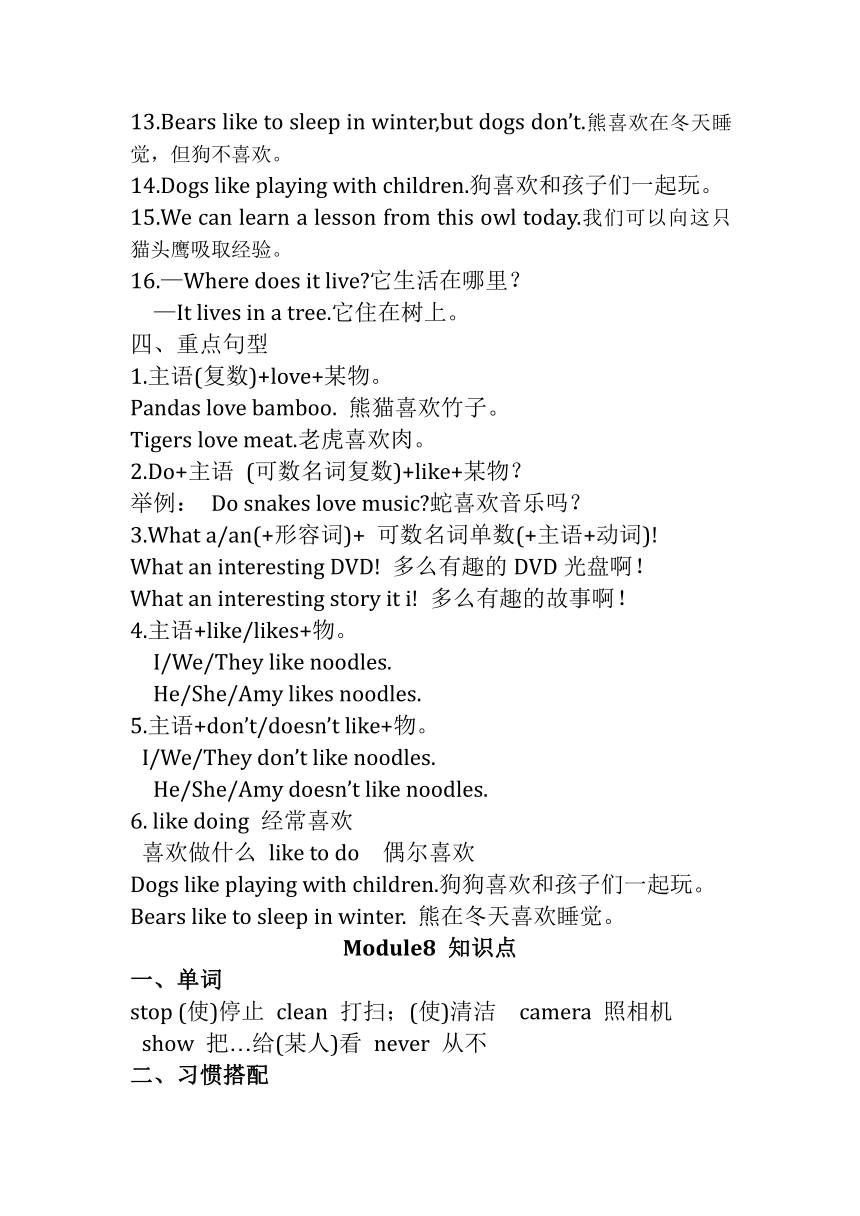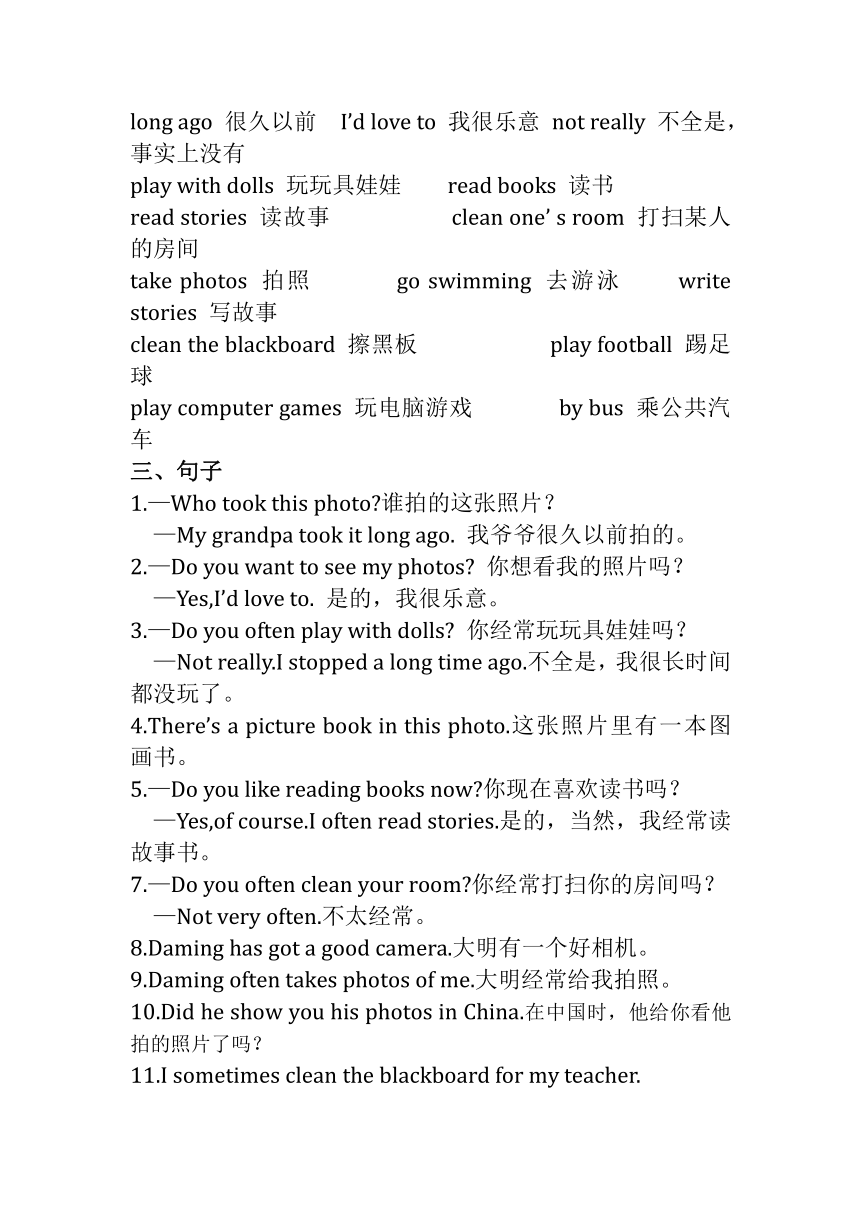知识点(Module7-10)(知识清单)外研版(三起)英语六年级上册
文档属性
| 名称 | 知识点(Module7-10)(知识清单)外研版(三起)英语六年级上册 |  | |
| 格式 | docx | ||
| 文件大小 | 24.7KB | ||
| 资源类型 | 教案 | ||
| 版本资源 | 外研版(三年级起点) | ||
| 科目 | 英语 | ||
| 更新时间 | 2024-06-06 20:50:30 | ||
图片预览



文档简介
六年级上册知识点(M7-M10)
Module7 知识汇总
一、单词
believe 相信 snake蛇 DVD数字化视频光盘,光盘
together 一起, 共同 lucky 幸运的 bamboo 竹子
its 它的 body 身体 flute 笛子 get变得, 变成
frightened 恐惧的,害怕的
二、习惯搭配
use sth to do sth 用什么来做什么 come out of 从…中出来
get frightened害怕in winter在冬天 look at ...看
play with..和…玩耍 in the tree 在树上
惯用表达
1. I don’ t believe it! 我简直不敢相信!
2. Do snakes love music 蛇喜欢音乐吗?
Does your dog eat music 你的狗吃音乐吗?
3. Grandma gives Daming a present. 奶奶送给大明一份礼物。
4.Pandas eat for twelve hours a day.熊猫一天中有12个小时都在进食。
5.The snake can use its body to dance.蛇可以用它的身体跳舞。
6.Why does the snake come out of the box 蛇为什么要从盒子里出来?
7.It says snakes can’t hear. 据说蛇听不到声音。
8.The snake gets frightened.蛇变得害怕。
9.What an interesting DVD.多么有趣的一张DVD光盘啊!
10.—Thank you again.再次谢谢您。
—You’re welcome.不用客气。
11.Snakes love the sun.蛇喜欢太阳。
12.Sheep like grass.绵羊喜欢草。
13.Bears like to sleep in winter,but dogs don’t.熊喜欢在冬天睡觉,但狗不喜欢。
14.Dogs like playing with children.狗喜欢和孩子们一起玩。
15.We can learn a lesson from this owl today.我们可以向这只猫头鹰吸取经验。
16.—Where does it live 它生活在哪里?
—It lives in a tree.它住在树上。
四、重点句型
1.主语(复数)+love+某物。
Pandas love bamboo. 熊猫喜欢竹子。
Tigers love meat.老虎喜欢肉。
2.Do+主语 (可数名词复数)+like+某物?
举例: Do snakes love music 蛇喜欢音乐吗?
3.What a/an(+形容词)+ 可数名词单数(+主语+动词)!
What an interesting DVD! 多么有趣的DVD光盘啊!
What an interesting story it i! 多么有趣的故事啊!
4.主语+like/likes+物。
I/We/They like noodles.
He/She/Amy likes noodles.
5.主语+don’t/doesn’t like+物。
I/We/They don’t like noodles.
He/She/Amy doesn’t like noodles.
6. like doing 经常喜欢
喜欢做什么 like to do 偶尔喜欢
Dogs like playing with children.狗狗喜欢和孩子们一起玩。
Bears like to sleep in winter. 熊在冬天喜欢睡觉。
Module8 知识点
一、单词
stop (使)停止 clean 打扫;(使)清洁 camera 照相机
show 把…给(某人)看 never 从不
二、习惯搭配
long ago 很久以前 I’d love to 我很乐意 not really 不全是,事实上没有
play with dolls 玩玩具娃娃 read books 读书
read stories 读故事 clean one’ s room 打扫某人的房间
take photos 拍照 go swimming 去游泳 write stories 写故事
clean the blackboard 擦黑板 play football 踢足球
play computer games 玩电脑游戏 by bus 乘公共汽车
三、句子
1.—Who took this photo 谁拍的这张照片?
—My grandpa took it long ago. 我爷爷很久以前拍的。
2.—Do you want to see my photos 你想看我的照片吗?
—Yes,I’d love to. 是的,我很乐意。
3.—Do you often play with dolls 你经常玩玩具娃娃吗?
—Not really.I stopped a long time ago.不全是,我很长时间都没玩了。
4.There’s a picture book in this photo.这张照片里有一本图画书。
5.—Do you like reading books now 你现在喜欢读书吗?
—Yes,of course.I often read stories.是的,当然,我经常读故事书。
7.—Do you often clean your room 你经常打扫你的房间吗?
—Not very often.不太经常。
8.Daming has got a good camera.大明有一个好相机。
9.Daming often takes photos of me.大明经常给我拍照。
10.Did he show you his photos in China.在中国时,他给你看他拍的照片了吗?
11.I sometimes clean the blackboard for my teacher.
我有时为我的老师擦黑板。
四、重点句型
1.Do you often+动词原形 (+其他)
eg: Do you often play with dolls 你经常玩玩具娃娃吗?
Do you often play football after class 你课后经常踢足球吗?
2.I often+动词原形(+其他).
eg: I often go swimming.我经常去游泳。
I often go shopping with my family.我经常和我的家人去购物。
3.询问日常生活习惯
Do you often+动词短语+其他?
①Yes,I do.
②Yes,of course.
③Not very often.
④Not really.
Module9 知识点
一、 词汇
around在四周,到处 all around 到处,遍及
member state成员国 inside 向室内, 向里面 should 应该
二、习惯搭配
the Great Wall 长城 the UN building 联合国大厦
in New York 在纽约 the flag of… …的国旗
all around the world 全世界 in the UN 在联合国
go inside 走进去 give sth to sb=give sb sth 给某人某物
one of the presents 其中一个礼物 take a photo 拍照
go to Shanghai去上海 fly to…飞去…
三、句子
1.I want to visit the Great Wall.
2.—Do you want to visit the UN building in New York
你们想要参观纽约的联合国大厦吗?
—Yes,we do.
3.What a big building.多么雄伟的建筑啊!
4.Here’s the flag of China. 这儿是中国国旗。
5.There are flags from all around the world.这里有来自世界各国的旗帜。
6.—How many member states are there in the UN 联合国有多少个成员国?
—There are 193.They make a big family.有193个,他们组成了一个大家庭。
7.—Do you want to go inside 你们想进去吗?
—Yes,please.是的,请(带我们进去吧)!
8.Many countries give presents to the UN.许多国家都给联合国赠送礼物。
9.I want to show Daming one of the presents from China.
我想让大明看一件来自中国的礼物。
10.I want to take a photo. 我想拍张照片。
11.I want to go to Shanghai.我想去上海。
12.Do you want to visit the Changjiang River 你想参观长江吗?
13.There are lots of beautiful places to go in China.
中国有许多美丽的地方可以去。
14.Shanghai is very big and very beautiful. 上海很大也很漂亮。
15.Kuming is in the south of China and it’s got a beautiful lake.
昆明在中国的南部,并且它有一个美丽的湖泊。
16.There are lots of mountains and lakes inGulin.
桂林有许多山和湖泊。
17.—I think we should go to all these places.我认为我们应该去所有这些地方。
—That’s a good idea.
18.My mother wants to go to Hong Kong .我妈妈想去香港。
三、句型结构
1.Do you want to+动词原形? “你想要做--.·。·吗?
eg: 一Do you want to drink some water 你想喝点水吗?
一 Yes,Ido.是的,我想。Yes,please.是的。
一No,I don’t. 不,我不想。
2. How many+可数名词复数+are there... 用于询问物品的数量。
一 (There is /are+)基数词(one,forty,>等).
eg:—How many computers are there in your company
你公司有多少台电脑?
—There are twenty. /Twenty.(有)20 台。
3.I want to+动词原形。 表示“我想要做某事。”
I want to play a game. 我想玩游戏。
I want to buy a present for my mother.我想给妈妈买一个礼物。
Module10 知识点
一、词汇
line (等候的)长队,队列 stand in line排队close关门,关闭
librarian 图书馆管理员rule规定, 规章quiet安静的
problem麻烦,困难,问题 cross穿过(马路等);渡过(河)
二、固定搭配
come here 过来 stand in line 排队 at five 在五点 No problem.没问题。
二、句子
1. Please come here and stand in line.请到这里来排队。
2.—Where are we going,Simon 我们要去哪里,西蒙?
—To the library.去图书馆。
3.The library closes at five.图书馆五点关门。
4.—What time is it now 现在几点了?
—It’s twenty to five now.现在四点四十了。(差二十分钟五点)
Look at the library rules.It says“Don’t talk in the library.”看图书馆规章制度,上面写着“图书馆内禁止谈话”。
6.Please be quiet. 请保持安静。
7.Here’s my library card.这是我的图书卡。
8.—What did you find,Simon 你找到了什么,西蒙?
—A book and a CD.一本书和一张光盘。
10.I think that’s difficult.我认为那很难。
11.Chinese isn’t easy to learn,you know.汉语并不好学,你知道的。
12.Don’t ride your bicycle here.不要在这儿骑你的自行车。
13.—How do I get to the school 我该怎么去学校?
—Turn right.右转。
14.The school is on your right.学校就在你的右边。
15.Don’t be late for school.上学不准迟到。
16.Don’t play football in the classroom.不要在教室里踢足球。
三、句型结构
1.Don’t+动词原形。 “不要做---
Don’t turn right here. 不要在这里右转。
Don’t be late for school. 上学不要迟到。
2.Please+ 动词原形。 “请·--
Please stand up. 请站起来。
3. No problem. “没问题。 /没关系。/没什么。/不客气。”
eg: 一 Thanks for your present. 谢谢您的礼物。
—No problem.不客气。
Module7 知识汇总
一、单词
believe 相信 snake蛇 DVD数字化视频光盘,光盘
together 一起, 共同 lucky 幸运的 bamboo 竹子
its 它的 body 身体 flute 笛子 get变得, 变成
frightened 恐惧的,害怕的
二、习惯搭配
use sth to do sth 用什么来做什么 come out of 从…中出来
get frightened害怕in winter在冬天 look at ...看
play with..和…玩耍 in the tree 在树上
惯用表达
1. I don’ t believe it! 我简直不敢相信!
2. Do snakes love music 蛇喜欢音乐吗?
Does your dog eat music 你的狗吃音乐吗?
3. Grandma gives Daming a present. 奶奶送给大明一份礼物。
4.Pandas eat for twelve hours a day.熊猫一天中有12个小时都在进食。
5.The snake can use its body to dance.蛇可以用它的身体跳舞。
6.Why does the snake come out of the box 蛇为什么要从盒子里出来?
7.It says snakes can’t hear. 据说蛇听不到声音。
8.The snake gets frightened.蛇变得害怕。
9.What an interesting DVD.多么有趣的一张DVD光盘啊!
10.—Thank you again.再次谢谢您。
—You’re welcome.不用客气。
11.Snakes love the sun.蛇喜欢太阳。
12.Sheep like grass.绵羊喜欢草。
13.Bears like to sleep in winter,but dogs don’t.熊喜欢在冬天睡觉,但狗不喜欢。
14.Dogs like playing with children.狗喜欢和孩子们一起玩。
15.We can learn a lesson from this owl today.我们可以向这只猫头鹰吸取经验。
16.—Where does it live 它生活在哪里?
—It lives in a tree.它住在树上。
四、重点句型
1.主语(复数)+love+某物。
Pandas love bamboo. 熊猫喜欢竹子。
Tigers love meat.老虎喜欢肉。
2.Do+主语 (可数名词复数)+like+某物?
举例: Do snakes love music 蛇喜欢音乐吗?
3.What a/an(+形容词)+ 可数名词单数(+主语+动词)!
What an interesting DVD! 多么有趣的DVD光盘啊!
What an interesting story it i! 多么有趣的故事啊!
4.主语+like/likes+物。
I/We/They like noodles.
He/She/Amy likes noodles.
5.主语+don’t/doesn’t like+物。
I/We/They don’t like noodles.
He/She/Amy doesn’t like noodles.
6. like doing 经常喜欢
喜欢做什么 like to do 偶尔喜欢
Dogs like playing with children.狗狗喜欢和孩子们一起玩。
Bears like to sleep in winter. 熊在冬天喜欢睡觉。
Module8 知识点
一、单词
stop (使)停止 clean 打扫;(使)清洁 camera 照相机
show 把…给(某人)看 never 从不
二、习惯搭配
long ago 很久以前 I’d love to 我很乐意 not really 不全是,事实上没有
play with dolls 玩玩具娃娃 read books 读书
read stories 读故事 clean one’ s room 打扫某人的房间
take photos 拍照 go swimming 去游泳 write stories 写故事
clean the blackboard 擦黑板 play football 踢足球
play computer games 玩电脑游戏 by bus 乘公共汽车
三、句子
1.—Who took this photo 谁拍的这张照片?
—My grandpa took it long ago. 我爷爷很久以前拍的。
2.—Do you want to see my photos 你想看我的照片吗?
—Yes,I’d love to. 是的,我很乐意。
3.—Do you often play with dolls 你经常玩玩具娃娃吗?
—Not really.I stopped a long time ago.不全是,我很长时间都没玩了。
4.There’s a picture book in this photo.这张照片里有一本图画书。
5.—Do you like reading books now 你现在喜欢读书吗?
—Yes,of course.I often read stories.是的,当然,我经常读故事书。
7.—Do you often clean your room 你经常打扫你的房间吗?
—Not very often.不太经常。
8.Daming has got a good camera.大明有一个好相机。
9.Daming often takes photos of me.大明经常给我拍照。
10.Did he show you his photos in China.在中国时,他给你看他拍的照片了吗?
11.I sometimes clean the blackboard for my teacher.
我有时为我的老师擦黑板。
四、重点句型
1.Do you often+动词原形 (+其他)
eg: Do you often play with dolls 你经常玩玩具娃娃吗?
Do you often play football after class 你课后经常踢足球吗?
2.I often+动词原形(+其他).
eg: I often go swimming.我经常去游泳。
I often go shopping with my family.我经常和我的家人去购物。
3.询问日常生活习惯
Do you often+动词短语+其他?
①Yes,I do.
②Yes,of course.
③Not very often.
④Not really.
Module9 知识点
一、 词汇
around在四周,到处 all around 到处,遍及
member state成员国 inside 向室内, 向里面 should 应该
二、习惯搭配
the Great Wall 长城 the UN building 联合国大厦
in New York 在纽约 the flag of… …的国旗
all around the world 全世界 in the UN 在联合国
go inside 走进去 give sth to sb=give sb sth 给某人某物
one of the presents 其中一个礼物 take a photo 拍照
go to Shanghai去上海 fly to…飞去…
三、句子
1.I want to visit the Great Wall.
2.—Do you want to visit the UN building in New York
你们想要参观纽约的联合国大厦吗?
—Yes,we do.
3.What a big building.多么雄伟的建筑啊!
4.Here’s the flag of China. 这儿是中国国旗。
5.There are flags from all around the world.这里有来自世界各国的旗帜。
6.—How many member states are there in the UN 联合国有多少个成员国?
—There are 193.They make a big family.有193个,他们组成了一个大家庭。
7.—Do you want to go inside 你们想进去吗?
—Yes,please.是的,请(带我们进去吧)!
8.Many countries give presents to the UN.许多国家都给联合国赠送礼物。
9.I want to show Daming one of the presents from China.
我想让大明看一件来自中国的礼物。
10.I want to take a photo. 我想拍张照片。
11.I want to go to Shanghai.我想去上海。
12.Do you want to visit the Changjiang River 你想参观长江吗?
13.There are lots of beautiful places to go in China.
中国有许多美丽的地方可以去。
14.Shanghai is very big and very beautiful. 上海很大也很漂亮。
15.Kuming is in the south of China and it’s got a beautiful lake.
昆明在中国的南部,并且它有一个美丽的湖泊。
16.There are lots of mountains and lakes inGulin.
桂林有许多山和湖泊。
17.—I think we should go to all these places.我认为我们应该去所有这些地方。
—That’s a good idea.
18.My mother wants to go to Hong Kong .我妈妈想去香港。
三、句型结构
1.Do you want to+动词原形? “你想要做--.·。·吗?
eg: 一Do you want to drink some water 你想喝点水吗?
一 Yes,Ido.是的,我想。Yes,please.是的。
一No,I don’t. 不,我不想。
2. How many+可数名词复数+are there... 用于询问物品的数量。
一 (There is /are+)基数词(one,forty,>等).
eg:—How many computers are there in your company
你公司有多少台电脑?
—There are twenty. /Twenty.(有)20 台。
3.I want to+动词原形。 表示“我想要做某事。”
I want to play a game. 我想玩游戏。
I want to buy a present for my mother.我想给妈妈买一个礼物。
Module10 知识点
一、词汇
line (等候的)长队,队列 stand in line排队close关门,关闭
librarian 图书馆管理员rule规定, 规章quiet安静的
problem麻烦,困难,问题 cross穿过(马路等);渡过(河)
二、固定搭配
come here 过来 stand in line 排队 at five 在五点 No problem.没问题。
二、句子
1. Please come here and stand in line.请到这里来排队。
2.—Where are we going,Simon 我们要去哪里,西蒙?
—To the library.去图书馆。
3.The library closes at five.图书馆五点关门。
4.—What time is it now 现在几点了?
—It’s twenty to five now.现在四点四十了。(差二十分钟五点)
Look at the library rules.It says“Don’t talk in the library.”看图书馆规章制度,上面写着“图书馆内禁止谈话”。
6.Please be quiet. 请保持安静。
7.Here’s my library card.这是我的图书卡。
8.—What did you find,Simon 你找到了什么,西蒙?
—A book and a CD.一本书和一张光盘。
10.I think that’s difficult.我认为那很难。
11.Chinese isn’t easy to learn,you know.汉语并不好学,你知道的。
12.Don’t ride your bicycle here.不要在这儿骑你的自行车。
13.—How do I get to the school 我该怎么去学校?
—Turn right.右转。
14.The school is on your right.学校就在你的右边。
15.Don’t be late for school.上学不准迟到。
16.Don’t play football in the classroom.不要在教室里踢足球。
三、句型结构
1.Don’t+动词原形。 “不要做---
Don’t turn right here. 不要在这里右转。
Don’t be late for school. 上学不要迟到。
2.Please+ 动词原形。 “请·--
Please stand up. 请站起来。
3. No problem. “没问题。 /没关系。/没什么。/不客气。”
eg: 一 Thanks for your present. 谢谢您的礼物。
—No problem.不客气。
同课章节目录
- Module 1
- Unit 1 It's more than twenty thousand kilometers l
- Unit 2 It's in the west.
- Module 2
- Unit 1 There's Chinese dancing.
- Unit 2 There are lots of beautiful lakes in China.
- Module 3
- Unit 1 Collecting stamps is my hobby.
- Unit 2 What's your hobby?
- Module 4
- Unit 1 Thanksgiving is my favourite festival.
- Unit 2 Our favourite festival is the Spring Festiv
- Module 5
- Unit 1 Can you be my Chinese pen friend?
- Unit 2 I can speak French.
- Module 6
- Unit 1 You've got a letter from New York.
- Unit 2 I've got a stamp from China.
- Module 7
- Unit 1 I don't believe it.
- Unit 2 Pandas love bamboo.
- Module 8
- Unit 1 Do you often play with dolls?
- Unit 2 I often go swimming.
- Module 9
- Unit 1 Do you want to visit the UN building?
- Unit 2 I want to go to Shanghai.
- Review Module
- Unit 1
- Unit 2
- Module 10
- Unit 1 Don't talk in the library.
- Unit 2 Go straight on!
